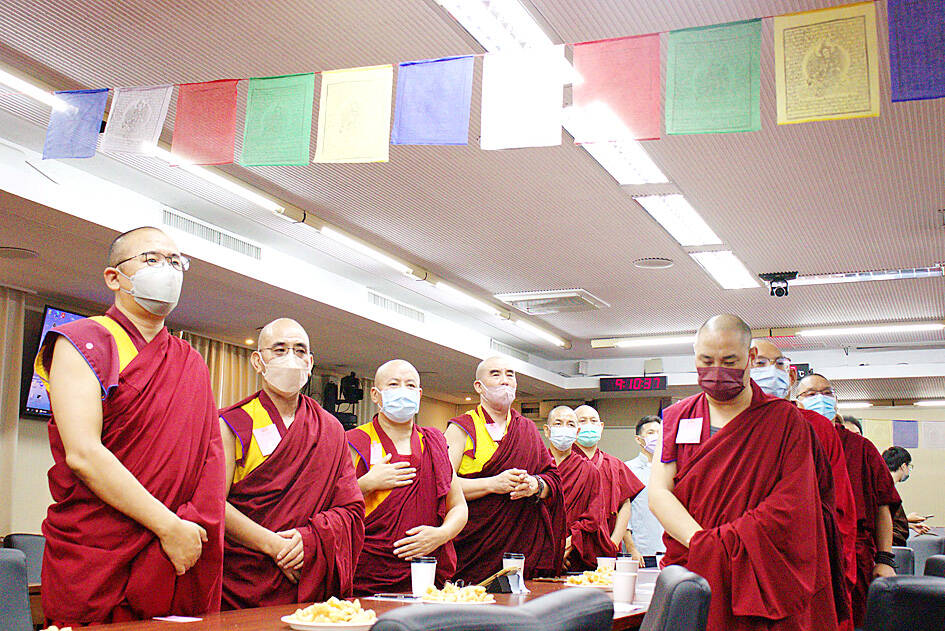Taiwan and Tibet share a democratic way of governance, and China’s oppression cannot make Tibetans abandon their belief in democracy, the Central Tibetan Administration’s Sikyong Penpa Tsering said in a pre-recorded message at an event yesterday marking the 62nd anniversary of the founding of Tibet’s government-in-exile.
Tsering’s pre-recorded comments were played at an event at the legislature in Taipei jointly held by the Taiwan Tibetan Welfare Association, the Dalai Lama’s Tibet Education Foundation and the Taiwan Parliament Group for Tibet to mark the founding of the Tibetan parliament in exile.
The 14th Dalai Lama and 80,000 Tibetans were exiled after China invaded the country in 1959, and on Sept. 2, 1960, the Dalai Lama established the organization now known as the Tibetan government-in-exile, becoming the first democratic body in Tibet.

Photo: CNA
Taiwan has experienced increased Chinese aggression around its territory this year, Tsering said.
However, he said he believes that Taiwan is prepared to counter China’s threat and prevent a Chinese invasion.
Independent Legislator Freddy Lim (林昶佐) said at the event that the Tibetan efforts over the past two decades had not been wasted, citing the first democratic election of the Central Tibetan Administration’s sikyong Lobsang Sangay in 2012.
The act symbolizes Tibet’s maturity as a nation and that the sikyong is no longer a symbolic role, Lim said.
Taiwan Parliament Group for Tibet Deputy Director-General Hung Shen-han (洪申翰) said he witnessed the accomplishments of the Central Tibetan Administration’s efforts over the past 10 years when in June he attended the 8th World Parliamentarians Convention on Tibet with Lim.
The attending members talked not only about Tibet, but also about how the international community should act against the oppression of authoritarian states, Hung said.
Tibetans have experiences to share with other countries suffering Chinese oppression, Hung added.
The former Soviet Union and the Chiang (蔣) family of the Chinese Nationalist Party (KMT) are examples of oppressive dictatorships, New Power Party Legislator Chiu Hsien-chih (邱顯智) said.
Democratic Progressive Party Legislator Michelle Lin (林楚茵) said that many support a democratic Tibetan government, adding that she hopes Tibetans continue their fight against the tyranny of the Chinese.
Wuer Kaixi, a prominent leader of China’s 1989 Tiananmen Square protests and living in exile in Taiwan, said his people, the Uighurs, have paid a great price for their resistance, but their sacrifice has allowed the world to understand the nature of the Chinese government.

Chinese spouse and influencer Guan Guan’s (關關) residency permit has been revoked for repeatedly posting pro-China videos that threaten national security, the National Immigration Agency confirmed today. Guan Guan has said many controversial statements in her videos posted to Douyin (抖音), including “the red flag will soon be painted all over Taiwan” and “Taiwan is an inseparable part of China,” and expressing hope for expedited reunification. The agency last year received multiple reports alleging that Guan Guan had advocated for armed reunification. After verifying the reports, the agency last month issued a notice requiring her to appear and explain her actions. Guan

GIVE AND TAKE: Blood demand continues to rise each year, while fewer young donors are available due to the nation’s falling birthrate, a doctor said Blood donors can redeem points earned from donations to obtain limited edition Formosan black bear travel mugs, the Kaohsiung Blood Center said yesterday, as it announced a goal of stocking 20,000 units of blood prior to the Lunar New Year. The last month of the lunar year is National Blood Donation Month, when local centers seek to stockpile blood for use during the Lunar New Year holiday. The blood demand in southern Taiwan — including Tainan and Kaohsiung, as well as Chiayi, Pingtung, Penghu and Taitung counties — is about 2,000 units per day, the center said. The donation campaign aims to boost

The Kaohsiung Tourism Bureau audited six hotels in an effort to prevent price gouging ahead of Korean band BTS’ concert tour in the city scheduled for Nov. 19, 21 and 22 this year. The bureau on Friday said that the audits — conducted in response to allegations of unfair pricing posted on social media — found no wrongdoing. These establishments included the local branches of Chateau de Chine, Hotel Nikko, My Humble House, and Grand Hai Lai, it said, adding that the Consumer Protection Commission would have penalized price gougers had the accusations been substantiated. The bureau said the Tourism Development Act

The military yesterday said it has located the flight data recorder, or black box, of an F-16V jet that disappeared off eastern Taiwan earlier this month, and it would soon deploy a salvage team to try to retrieve it. Air Force Command Headquarters said that while it had pinned down the location of the black box, it was still searching for the aircraft’s sole pilot, air force Captain Hsin Po-yi (辛柏毅). Without providing details, the air force said it had located the black box days after detecting some intermittent signals and would now engage a team of professionals to retrieve it. The air